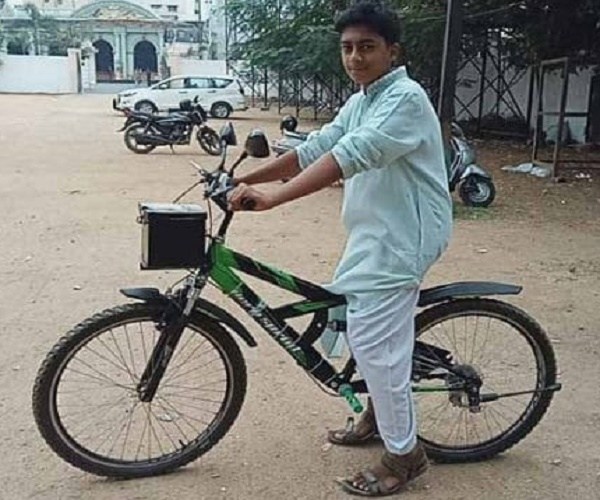While it has been a trend among the youth to study abroad and explore the field of science, a 15-year-old student returned to India from UAE to pursue his passion in science and went on to make a battery-run bicycle with his savings.
Meet Abdul Quadir Omer, an intermediate first year student of Sri Medha Junior College, Santosh Nagar in Hyderabad.
Raised and educated in Sharjah, Abdul chose not to take the usual path taken by his friends, when it came to pursuing higher education. He chose to come back to his ancestral city of Hyderabad to experience a new kind of academic life. However, his father Mohammad Omer Quadri, who is a Public Relations Officer (PRO) for a reputed firm in Sharjah, was a bit hesitant to send his son for higher studies in Hyderabad.
“My father always dreamed of seeing his son going for a career in Chartered Accountancy. But, my interest was always in the science field. But, he accepted my request when I expressed my wish to study in India,” smiles Abdul.
Within months of joining the college, Abdul got fascinated about battery run vehicles when he first saw an electric moped that was made by his maternal grandfather Mir Inayath Ali, who is a journalist by profession. “One day, I took my cousin’s bike and went on a ride on the city roads. The traffic police caught and penalised me for underage driving. This led me to create something innovative, which, in turn led to the battery-run-bicycle,” he says.
After purchasing a cycle for Rs 5,000, Abdul spend another Rs 15,000 on electric equipment for his battery cycle project. He set up 24 volts Amaron dry batteries and a controller underneath the bicycle’s seat which provides power, according to the acceleration. A Permanent Magnet DC (PMDC) motor is fixed on the free wheel of the rear tyre which is enabled to remove the pedal. Abdul’s bicycle now runs 30 to 35 kms on a single charge. It takes three hours to charge the battery. With slight modifications, Abdul has plans to fix a dynamo to his cycle.
The 15-year-old says, that he can also make 48 volts motor battery electric rickshaws. “I have seen rickshaw pullers in Nampally ferrying huge weights of furniture or industrial equipment. If I could fix the motor battery to rickshaws for an affordable price, it will be a great help to daily wagers,” he says.
Abdul says that he has further plans to study graphene technology which has great potential due its high conductivity and heat. “Now the future is in graphene. Countries like America and China have already started experiments and tapping energy from it. And I want to study it,” Abdul says. #KhabarLive







